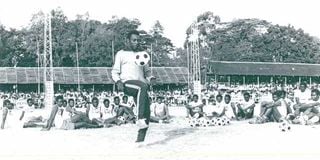Breaking News: Former Lugari MP Cyrus Jirongo dies in a road crash
Kipchoge Keino’s 1972 Rio lunch date with Pele

Pele gives a few tips to young football players and fans at Jamhuri Park, Nairobi, during his tour of Kenya in February 1976.
What you need to know:
- ‘Kip’ later met the Brazilian again during his 1976 visit to Kenya and later the two legend reviewed progress of their shared goals in Buenos Aires in another meeting in 1988.
- Kip’ was one of the most sought-after black athletes in the world then, especially in the USA, since he beat 1,500m world record holder, Jim Ryun.
Two-time Olympic champion and middle distance running legend Kipchoge Keino at the weekend recalled how he became the first Kenyan to visit Pele at his house in Rio de Janeiro on Christmas Day half a decade ago.
Keino describes the Brazilian superstar as “a man who did his best for humanity and the youth of this world.”
“Kip”, as the Kenyan legend is popularly known, was fresh from the 1972 Munich Olympic Games where he won the 3,000 metres steeplechase gold medal ahead of spending a memorable Christmas that year in the Brazilian city.
“Kip” was one of the most sought-after black athletes in the world then, especially in the United States of America, since beating the then 1,500 metres world record holder, American Jim Ryun, at the 1968 Mexico Olympics. Pele was, on the other hand, the most recognisable sports superstar in the rank of boxing superstar Mohammad Ali globally.
Their paths were destined to cross on the best calendar date in the world as it happened in 1972.
Still an active footballer, despite having retired from the Brazil national team after the 1970 World Cup, Pele was always the man of the moment, engaging in sporting activities away from the football pitch.
Hence his presence at an exhibition race that Christmas night.
“I have lost a dear friend who invited me for a Christmas lunch in his house while being far away from home in 1972,” Keino reminisced.
“We were athletes from various parts of the world who had been invited for a fun road relay race together with many Brazilians in Rio at the stroke of midnight to usher in Christmas," recalled “Kip.”
“Pele was there at the start and finish of the race and kindly made us feel at home and invited us for lunch. It was one of the best Christmas celebrations that I have ever enjoyed," remembered “Kip,” also one of the most decorated sports personalities off the field of play in Africa for his humanitarian work for the less privileged in Kenya.
“We ate rice and bread before starting a conversation on helping the youth of this world, something which has been dear to us to this day,” said the former National Olympic Committee Kenya (NOC-K) Chairman, philanthropic to a fault, having been inspired by that little talk with Pele in Rio.
“We agreed that I help develop athletics amongst the youth and him football by training teachers as coaches in schools in our respective countries,” recalled “Kip”, who later met the Brazilian again during his 1976 visit to Kenya and later reviewed progress of their shared goals in Buenos Aires, Argentina, in another meeting in 1988.
“We come into this world empty handed and leave it empty handed. But Pele has done a lot to develop football. He has left a living legacy. It is unfortunate that we have lost such a great man,” said Eldoret-based Keino in an exclusive interview with Nation Sport.
Kipchoge, like Pele, dedicated his hard-won resources to the youth of the world.
Pele toured several African countries including Kenya, Uganda and Nigeria in a Pepsi Cola-sponsored tour to impact practical lessons to young aspiring football players in 1976.
Pele won many awards and accolades, and shared one platform with Keino in receiving a Lifetime Achievement Award at the Laureus World Sports Awards in 2000, an accolade handed to “Kip” the following year.
The Laureus Awards are the sporting equivalent of the Oscars.
Pele and politics
Pele is revered in Brazil as the eternal “King of Football.”
But the legendary player’s image is more complicated when it comes to the trickier terrain of politics in his home country, where he faced criticism for his failure to speak out on racism and his supposed closeness with the former military regime.
Widely regarded as the greatest footballer in history, Pele died Thursday at age 82, triggering an outpouring of emotion in Brazil -- and a national reexamination of his legacy.
Pele’s surge to global superstardom overlapped with the rise of Brazil’s Cold War-era military regime, which ruled the South American country with an iron fist from 1964 to 1985.
The legendary player was photographed rubbing shoulders with the likes of dictators Emilio Garrastazu Medici and Ernesto Geisel, two of the most hardline generals to preside over a regime that killed or “disappeared” hundreds of people.
Clutching his World Cup trophies and grinning alongside the generals, the black footballer also drew criticism for his silence on racism, at a time when Brazil -- the last country in the Americas to abolish slavery -- was presenting itself to the world as a harmonious “racial democracy.”
“He acted like a submissive black who accepts everything and fights nothing,” fellow player Paulo Cezar Caju, his teammate on Brazil’s storied 1970 World Cup-winning squad, once said.
Additional reporting by AFP





